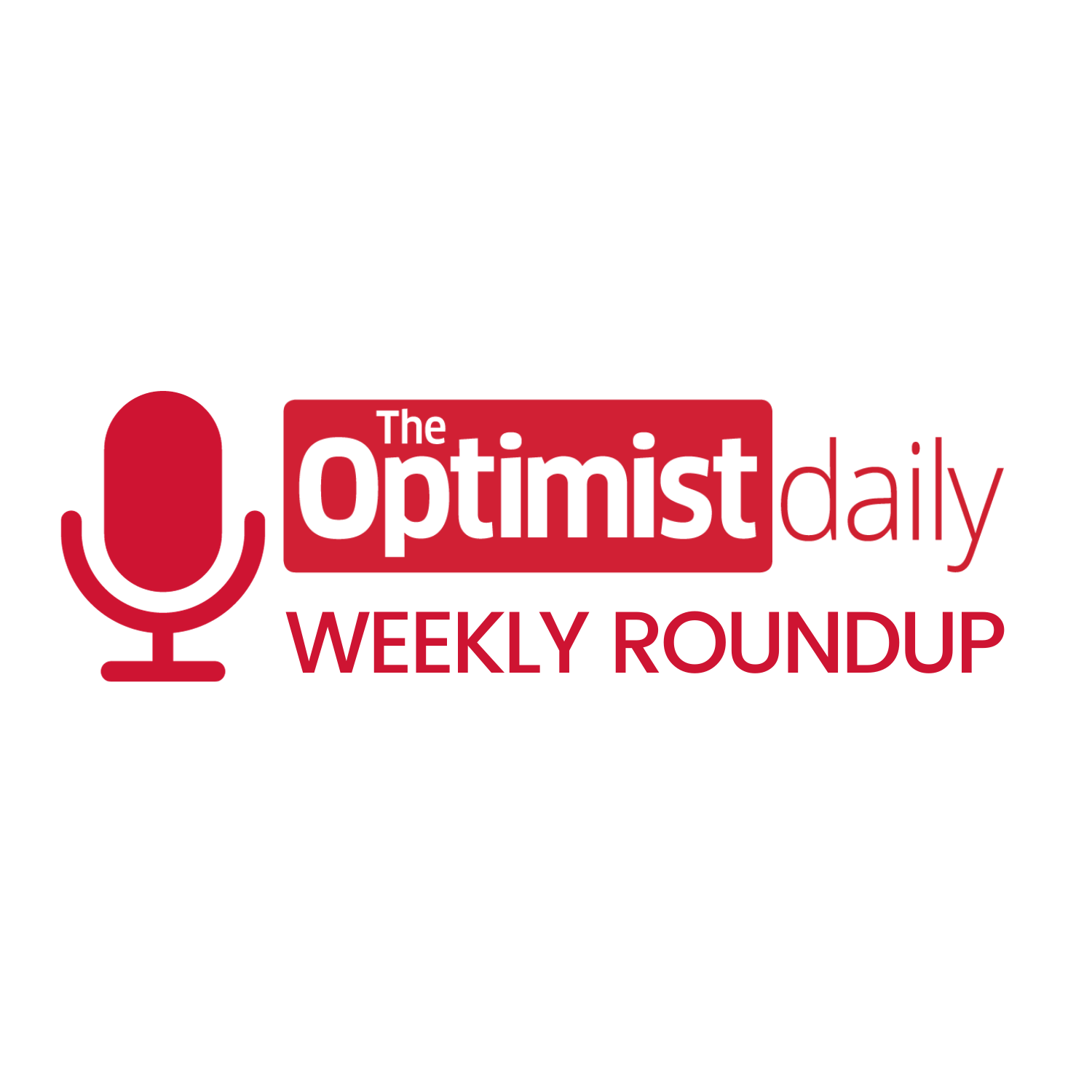Episode Description
Today’s solutions-news:
Arielle dives into a surprising community-focused solution that solves many problems at once. Then, Karissa shares the uplifting news that over 800 veterans who were previously removed under the now-repealed “don’t ask, don’t tell” policy have had their discharge statuses upgraded to honorable.
The Optimist Daily is a project of The World Business Academy.
Donate link: https://www.optimistdaily.com/donate-to-support-the-optimist-daily/?gift=Y%20http://
Transcript:
Theme music
Arielle:
Hello and welcome to The Optimist Daily’s weekly roundup. I’m Arielle.
Karissa:
And I’m Karissa, and we’re working hard to put solutions in view and optimism in movement.
Arielle:
Alright, we’re back after a little break with another episode of our podcast to share the solutions from The Optimist Daily this week. So, Karissa, how were the past two weeks for you?
Karissa:
Pretty chill for the most part, starting to trickle into some fall activities—finally went to the pumpkin patch and got some cooler weather here in the Central Valley of California. But yeah, it was nice to take a little break and heal from my long cough that was happening.
Arielle:
Yeah! You sound a lot better.
Karissa:
Yeah, I finally feel better, and I don’t have to cough on the podcast, even though we cut it out.
Both:
(Laugh)
Karissa:
How about you, Arielle? How’ve the past two weeks been?
Arielle:
Everything’s been going really well! The weather here has been amazing in Amsterdam, and actually just in our little part of the world because when I was in London last week, it was also gorgeous fall weather, so I’m definitely thankful for that. And, yeah, just been really enjoying our Changemaker Series that we have going on until Thanksgiving. Yeah, we didn’t get to mention which change makers were highlighted the weeks before. So I guess we’ll go ahead and tell you about them.
Last week, we highlighted the Coalition for Compassion and Justice, which is offering life-changing programs and housing solutions for homelessness. So, love that. And we also highlighted the Fish Reef Project, a nonprofit dedicated to building artificial reefs to provide essential habitats for fish, turtles, corals and other marine creatures.
Karissa:
Yeah, and this week we’re covering the Lahaina Restoration Foundation. Their mission is to protect and share Lahaina’s cultural heritage, which is especially important now after the devastating fires in August 2023 which dealt a severe blow to the historic town, with many cherished landmarks destroyed or damaged. The Lahaina Restoration Foundation spearheads efforts to rebuild these landmarks and help the community heal.
Arielle:
That was part of the Maui fires, right?
Karissa:
Yeah.
Arielle:
Lahaina’s located in that region.
Karissa:
Glad to see the community stepping in. Also in another community, the Montana Institute offers a refreshing and solutions focused approach to community health and safety that is rooted in their science of the positive framework. Definitely go read more about these changemakers and thank you again for submitting your stories to us and letting us share with the rest of the Optimist Daily community.
Arielle:
Yes, it’s really been amazing. And actually, speaking of solutions for a happy and healthy community, today I’m going to be talking about a unique solutions-focused strategy that tackles two big problems at once which are food insecurity and food waste. So do you mind if I actually just jump into my solution of the week?
Karissa:
Yeah, let’s talk about it!
Arielle:
Alright, so, the title of the article is “How Donating Expiring Food Boosts Supermarket Profits While Tackling Food Insecurity.” Yeah, we’re basically diving into how donating food that’s approaching its expiry date has become a win-win for both supermarkets and communities in need, and it’s pretty amazing to me how this simple act can benefit so many layers of society.
Karissa:
Wait, so how does it work? Are we talking about supermarkets just handing out food about to go bad —wouldn’t that hurt their business?
Arielle:
You’d think so, but in fact it’s quite the opposite. Big retailers like Kroger, Walmart, and Costco have been stepping up and donating food that’s approaching its expiration date to food banks. And here’s the unexpected benefit — this actually ends up boosting their profits, not hurting them. In 2022 alone, supermarkets donated about 2 billion pounds of food, worth $3.5 billion.
Karissa:
Wow, that’s a lot of food! But how does giving it away help their profits?
Arielle:
Yeah, that’s a great question. So basically, it boils down to a couple of key financial benefits. First off, supermarkets can get tax breaks for these donations, which lowers their overall operational costs, but there’s more pros that are less obvious. So, when stores remove expiring items from shelves and donate them, they free up valuable space for fresher, more appealing products. So, this “preemptive removal” which is what researchers like John Lowrey from Northeastern University call it, actually leads to an increase in sales and improves the store’s image with fresher inventory on display.
Karissa:
Yeah. So, they’re basically swapping out the not-so-fresh food for stuff that’s in better shape. And that helps boost their image and profits, right?
Arielle:
Exactly. According to the researchers, when customers see fresher, higher-quality products, they’re more likely to shop there again and spend even more. Lowrey’s team even found that this practice increased average food prices by 1%, leading to a 33% increase in profit margins. And by the way, supermarkets typically operate on margins of less than 3%, so that 33% bump is huge.
Karissa:
So, it’s not just about generosity—it’s smart business. But what about discounting food? Wouldn’t selling expiring products at a lower price be a better way for stores to make money?
Arielle:
Actually, discounting isn’t always the best option. Discounted items still take up precious shelf space that could be used for fresh products, and on top of that, when customers see items that are obviously close to expiring—think bruised fruit or nearly expired milk—it can hurt the store’s overall image. Lowrey pointed out that consumers tend to judge the entire store’s quality based on the state of its products, so displaying aging food can actually make shoppers question the freshness of everything else on the shelves.
Karissa:
Oh yeah, totally. That makes sense. If I see old bananas next to fresh ones, I’d start wondering about everything else in the store.
Arielle:
Mmhm, yeah. But when stores donate expiring food instead, they kill two birds with one stone. They clear out space for fresh inventory and help their brand image while doing some good for the community. And of course, the donated food doesn’t go to waste. It goes to people who really need it. In America alone, there are actually millions of people suffering from food insecurity.
Karissa:
It sounds like such a seamless solution—reducing food waste, helping people, and boosting profits. Well, so kind of three benefits I guess, but I bet there still are some challenges with this, right, especially around the logistics of all of it.
Arielle:
Mmhm. That is one of the biggest challenges while donating food is great in theory, making it happen consistently can be tricky. There are transportation issues like getting that perishable food to food banks in time before it actually goes bad. And then there’s the fact that not all stores donate all types of food. For example, some may focus only on items like meat or baked goods, while other perishables might still end up getting wasted.
Karissa:
So even though this strategy is working, there still has to be room for improvement.
Arielle:
Yeah. The good news is that despite the logistical hurdles, this method is still one of the most effective ways to fight food insecurity and reduce waste. As more stores embrace consistent donation routines and partner more efficiently with food banks, we’ll see even more benefits. So, it’s all about building those partnerships and the more food they can donate, the more communities they’ll be able to help.
Karissa:
Yeah, it’s just so incredible how one solution can address multiple issues from food insecurity, food waste, brand image, and even store profits.
Arielle:
Totally! And it’s a great example of how businesses and communities can work together for mutual benefit. In a world facing hunger and waste, these kinds of solutions are exactly what we need—ones that acknowledge the interconnectedness of our food systems, environment, and economy.
Karissa:
Yes! I love, love, love these localized solutions. And also, I love the role of business in you know, providing for our communities and our world too, because, as we’ve mentioned before, our parent organization, the World Business Academy, really focuses on that role of businesses serving their communities.
Arielle:
Mmhm.
Karissa:
Well, this is awesome, Arielle. Thank you so much for walking us through this really awesome concept. Such a win-win for supermarkets, food banks and communities. And I hope that more retailers will hop on board.
Arielle:
Yeah. And I mean it is getting to the holiday season, so maybe now is a really good time for stores to start thinking about not just a seasonal approach to donating but making it a mainstay of their… I don’t know. Overall business plans. Yeah, cause apparently, it’s good for profits as well. So, here’s hoping more stores adopt this approach and just keep the cycle of good going.
Karissa:
Yeah! Well, I have a solution that doesn’t really have a graceful segue, but it’s definitely some good news that I was really happy to see this week. So, do you mind if I switch over to my solution?
Arielle:
Go for it.
Karissa:
All right, so my solution is titled Hundreds of veterans obtain honorable discharges following the Don’t Ask Don’t Tell Review.
Karissa:
The United States Department of Defense announced that over 800 veterans who were previously removed under the now-repealed Don’t Ask, Don’t Tell policy have had their discharge statuses upgraded to honorable. This historic action finally begins to address the harms caused by the discriminatory policy.
Arielle:
Wow.
Karissa:
This investigation comes more than a decade after the policy was revoked.
Arielle:
Oh, wow. This is such a watershed moment for LGBTQ+ veterans in the United States.
Karissa:
Absolutely. Like Defense Secretary Lloyd Austin said, brave LGBTQ+ Americans have long volunteered to serve the country they love. He emphasized the long-overdue efforts to rectify the injustices experienced by these service personnel. A recent study focused on 851 instances, with 96.8% qualifying for relief, resulting in honorable discharges for the great majority of veterans involved.
Arielle:
This is amazing news. Can you rewind a little bit and share more history on what the Don’t Ask, Don’t Tell policy was?
Karissa:
Yeah, so between 1994 and 2011, the Don’t Ask, Don’t Tell policy prevented openly gay and lesbian military personnel from serving, which resulted in the dismissal of over 13,000 people simply for their sexual orientation.
Arielle:
Hmm.
Karissa:
Yeah, and while the program was overturned in 2011, the consequences of those discharges persisted, with many veterans still receiving discharge classifications that denied them full military benefits. Defense Secretary Austin underscored the importance of correcting these errors, adding that 96% of those individuals now have an honorable discharge. This critical shift allows them to receive benefits that were previously denied. Although veterans discharged under Don’t Ask, Don’t Tell could apply for an upgrade to honorable discharge after the policy was repealed, many were unaware of this possibility.
Arielle:
What did the military do to make sure these individuals were no longer left behind?
Karissa:
The Pentagon’s year-long, proactive investigation helped in this situation. According to Christa A. Specht, a legal policy director at the Defense Department, about 2,000 veterans were separated with less than honorable characterizations, and this review sought to right those wrongs.
Karissa:
This study served as a stark reminder of the decades-long prejudice that LGBTQ+ military personnel have suffered. Between World War II and 2011, historians estimate that over 100,000 service members were forced to leave the military because of their actual or perceived sexuality.
Arielle:
100,000—that’s a huge number. These upgrades to honorable discharges are such an important step in addressing this troubling legacy.
Karissa:
Yeah, and for many veterans, this shift not only restores their dignity but also allows them to receive all the military benefits they were previously denied. Honorable discharges are required for benefits like healthcare, education support, and housing loans from the Department of Veterans Affairs. With this upgrade, LGBTQ+ veterans can now fully enjoy the benefits they earned while serving, which are certainly well deserved.
Arielle:
Yeah, most definitely well-deserved. And I’m guessing this move is receiving a lot of appreciation.
Karissa:
Absolutely. LGBTQ+ organizations have largely hailed the Pentagon’s move and view it as a significant step towards justice for veterans wrongly dismissed under the policy. While this assessment provides some closure for those affected, it also highlights the ongoing need for advocacy for LGBTQ+ rights and recognition in the military. A little righting of the wrongs is definitely great to see.
Arielle:
Mm-hmm. Yeah, and it shows how far we’ve come. Obviously, we still have a lot of work to do as a society, but it’s good to see some progress.
Karissa:
I hope that you know, in any country where you serve, this can be similarly… um… I guess…
Arielle:
Implemented.
Karissa:
Implemented. Yeah.
Arielle:
Well, this is really great news. I’m feeling quite positive and optimistic, and yeah, going into a stressful week, this will be needed, all the good feels are needed (laughs).
Karissa:
Yeah, definitely.
Arielle:
That was a great roundup of solutions. We’ve got some other great solutions from this week that you can find on our website, optimistdaily.com, and they include…
Karissa:
Everything you need to know for voting in the 2024 election—next week is the election, so definitely check out this article. Make sure you’re registered to vote in the United States and get out there and vote—it’s so important.
Karissa:
We also have an article on a new cervical cancer treatment that brings risk and mortality down by 40%, From pollution to progress—the recovery of the Cuyahoga River—and How to determine your productivity style and maximize your workflow. What else do we have, Arielle?
Arielle:
We have an article titled It’s never too late—quitting smoking at any age can add years to your life, study finds,” Halloween isn’t the only spooky celebration—8 fascinating festivals from all across the world, This revolutionary ADHD headset and game identifies cases with 95% accuracy,” and of course, our local changemakers of the week: the Lahaina Restoration Foundation and the Montana Institute.
Karissa:
And if you want to start your day off right, make sure to subscribe to our free daily newsletter to get our solutions straight to your inbox.
Arielle:
We also have a lot more on our social channels. You can find us @OptimistDaily on all platforms, including Threads and Pinterest. The only different one is on X—on there, we’re known as @OdeToOptimism.
Karissa:
We are a small team of optimists working hard to bring you positive news. If you want to support our mission of putting optimism into the world, click on the link in the show notes to find out how.
Arielle:
And remember that support doesn’t always have to be financial. Just recommending our podcast to a friend, leaving a positive review on Apple or Spotify, forwarding a link, or sharing a solution on your socials—anything like that would be a big help for us.
Karissa:
We’ll be back next week with more solutions. I’m looking forward to it.
Arielle:
Yeah, me too. Until then, I hope everyone has a relaxing weekend and a good week ahead.
Karissa:
Bye, everyone!











